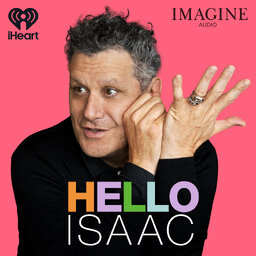2-Time Super Bowl Champion, Malcolm Jenkins
Isaac Mizrahi chats with former NFL star, Malcolm Jenkins, about how influential the women in his life are, why failure inspires him, the importance of reinventing yourself and more.
Follow Hello Isaac on @helloisaacpodcast on Instagram and TikTok, Isaac @imisaacmizrahi on Instagram and TikTok and Malcolm Jenkins @malcolmjenkins.
(Recorded on October 17, 2023)
In 1 playlist(s)
Hello Isaac with Isaac Mizrahi
Isaac Mizrahi is an expert - at almost everything! He’s an iconic fashion designer, actor, singer, …Social links
Follow podcast
Recent clips

Emmy-Winning Actor and Director, Pamela Adlon
51:37

Interior Designer & TV Host, Jeremiah Brent
49:51

Podcast Host & Crooked Media Co-Founder, Jon Lovett
50:53
 Hello Isaac with Isaac Mizrahi
Hello Isaac with Isaac Mizrahi